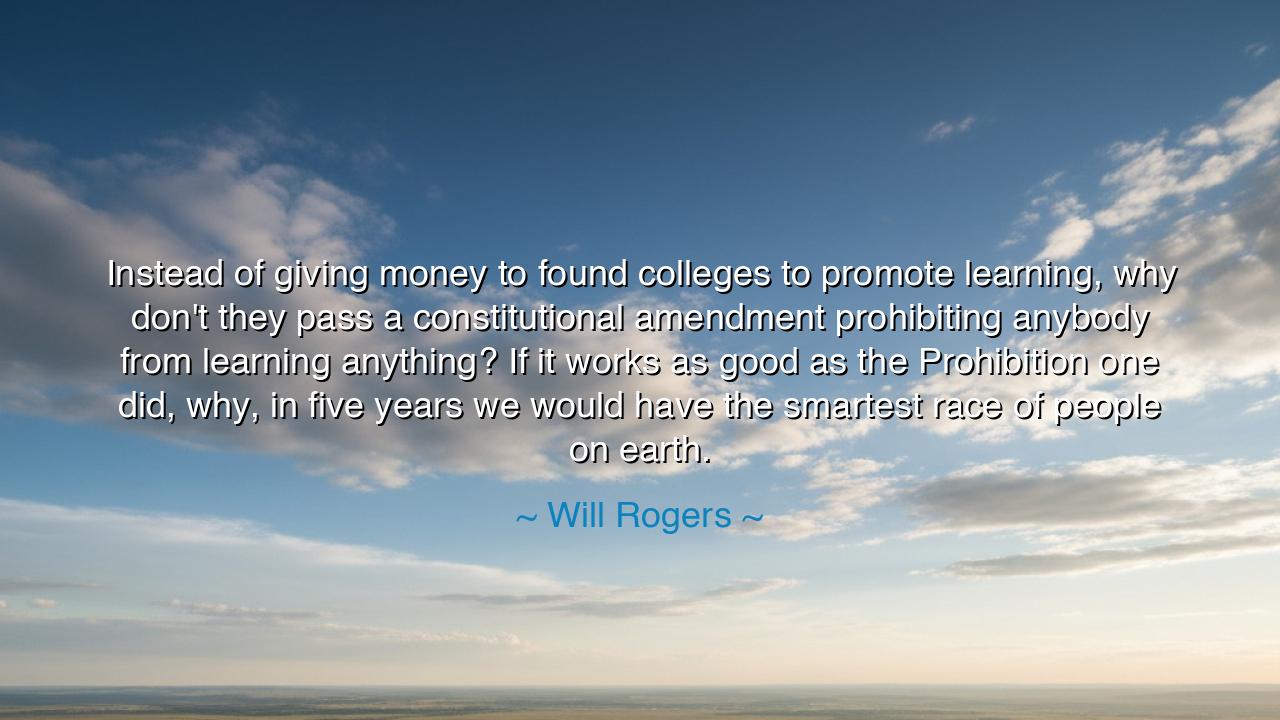
Instead of giving money to found colleges to promote learning
Instead of giving money to found colleges to promote learning, why don't they pass a constitutional amendment prohibiting anybody from learning anything? If it works as good as the Prohibition one did, why, in five years we would have the smartest race of people on earth.






When Will Rogers wrote, “Instead of giving money to found colleges to promote learning, why don't they pass a constitutional amendment prohibiting anybody from learning anything? If it works as good as the Prohibition one did, why, in five years we would have the smartest race of people on earth,” he spoke with the wit of a jester and the wisdom of a sage. Beneath his humor lies a blade of truth — a satire so sharp it cuts through the hypocrisy of his age and ours. In his jest, Rogers reveals a paradox: that when something is forbidden, human nature rises in rebellion; when knowledge is suppressed, the hunger for truth becomes unstoppable. His words, though playful, carry the eternal insight that the mind thrives not in comfort, but in resistance — and that ignorance cannot be legislated out of existence.
The origin of this quote lies in the era of Prohibition — that strange chapter in American history when the government sought to outlaw the sale and consumption of alcohol. The result, as Rogers so wryly observed, was not sobriety but excess. Speakeasies flourished, bootleggers grew rich, and crime syndicates turned corruption into empire. The law meant to destroy vice instead multiplied it. Rogers, ever the philosopher of common sense, turned this irony toward the realm of learning. If banning liquor led to drunkenness, perhaps banning knowledge would lead to enlightenment! His words, humorous on the surface, carry the deeper meaning that human curiosity, like thirst, cannot be suppressed — it only burns brighter when denied.
In the style of the ancients, we might say that Rogers understood the stubborn divinity of the human spirit. The Greeks knew this truth when they told the story of Prometheus, who defied the gods to bring fire — the symbol of knowledge — to mankind. The gods punished him for this act, chaining him to a rock where an eagle tore at his liver each day. Yet even in torment, Prometheus refused to repent, for he knew that once humanity had tasted the light, it could never again be content with darkness. Rogers’s irony carries this same fire — that if society tried to ban learning, the flame of human intellect would rise in defiance and burn even brighter. For to know is as natural to the soul as to breathe.
Rogers’s wisdom also speaks against a quieter, more dangerous kind of Prohibition — not one of law, but of complacency. He saw a world where many sought comfort instead of curiosity, where institutions often produced obedience rather than insight. His satire of “founding colleges to promote learning” is not a mockery of education itself, but of systems that mistake structure for spirit. True education, he implies, cannot be bought, legislated, or confined to ivory towers. It is born of rebellion — the kind that dares to ask questions no one else will. Like the Socrates of ancient Athens, who was condemned for “corrupting the youth,” Rogers believed that the vitality of a people depends on their willingness to challenge the walls built around their minds.
History offers proof of Rogers’s insight. When Galileo Galilei declared that the Earth moved around the Sun, he was silenced by decree, forbidden to teach what he knew. Yet his discovery could not be unlearned, for truth has a way of slipping through chains. When books were burned in ancient and modern times — by tyrants, by inquisitors, by ideologues — they were not truly destroyed. Their ideas lived on, whispered from generation to generation, carried by those who refused to stop thinking. Every act of suppression has been answered by an act of defiance. Rogers’s humor, then, is prophetic: if ignorance were made law, enlightenment would become rebellion, and the human race would, indeed, grow “the smartest on earth.”
And so, his jest is also a call to courage. He reminds us that learning is not passive — it is an act of resistance. To learn is to defy ignorance; to seek truth is to challenge every force that profits from falsehood. The greatest teachers in history — Confucius, Socrates, Hypatia, Galileo, and countless others — were not favored by their societies. They were questioned, silenced, or even destroyed. Yet their legacies endure because they refused to bow before the gods of comfort and conformity. As Rogers implies, if learning were outlawed, the brave would still find a way to learn — and in their defiance, wisdom would flourish.
The lesson, then, is timeless: the human mind cannot be chained. No government, no institution, no social custom can forbid the instinct to know, to question, to grow. Learning is not something granted by authority; it is the birthright of every soul. Let this truth guide you: do not wait for permission to seek understanding. Do not mistake the existence of schools for the presence of wisdom. Question boldly. Read deeply. Think freely. For every age has its own form of prohibition — and every age demands its own Prometheus to steal the fire back.
So remember the laughter of Will Rogers, which was the laughter of a prophet in disguise. His humor was not lightness but light — a torch that illuminated the absurdities of power and the resilience of the human spirit. He taught us that even in jest, truth burns bright. And if ever the world should try to forbid learning, then, as he promised, may we become the smartest race of people on earth — not because we were allowed to learn, but because we refused to stop.






AAdministratorAdministrator
Welcome, honored guests. Please leave a comment, we will respond soon